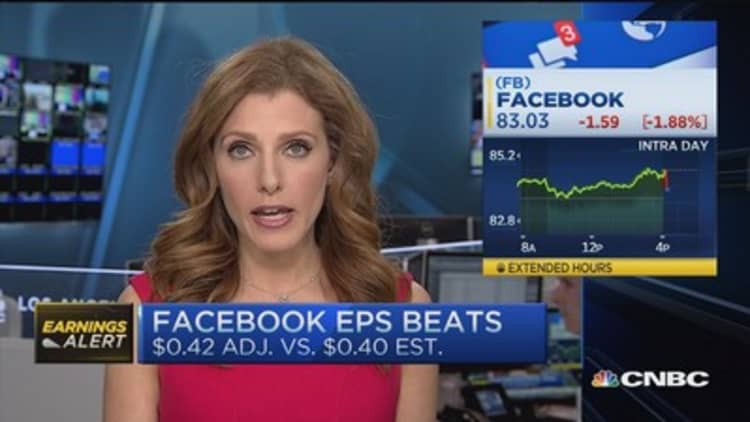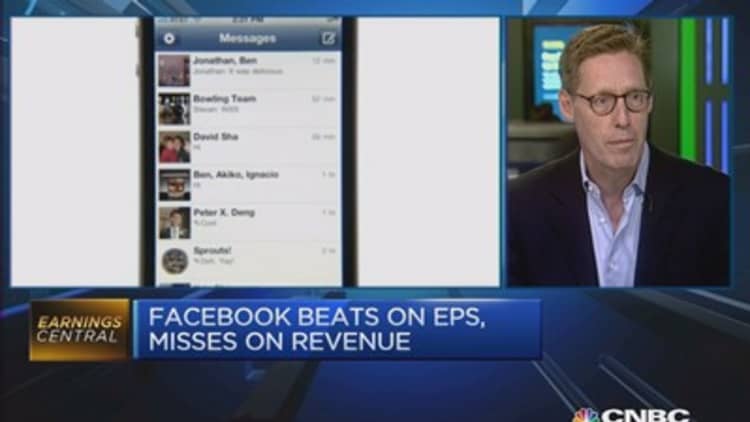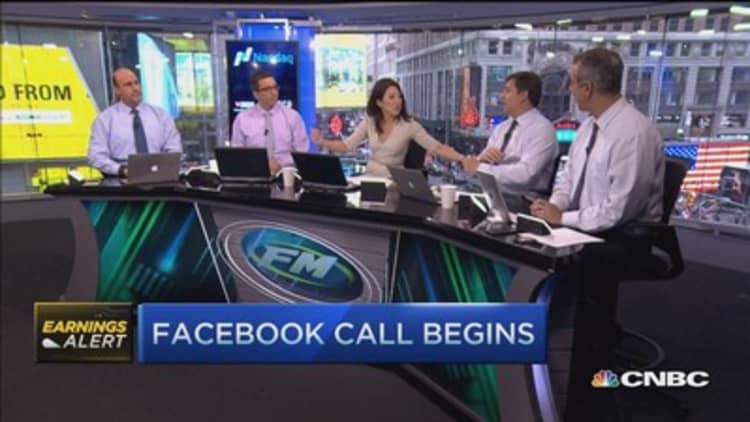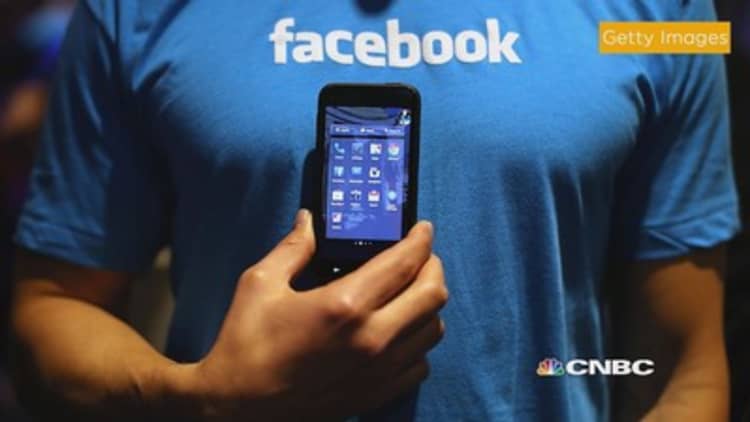





Facebook's first quarter revenue missed analyst expectations on Wednesday, but the social media giant announced strong user growth that showed its monthly user base was now larger than the population of China.
The tech firm reported earnings of 42 cents per share on revenue of $3.54 billion after the closing bell. Analysts had expected Facebook to report earnings of 40 cents per share on $3.56 billion in revenue, according to a consensus estimate from Thomson Reuters.
The social media giant had never before come in light on revenue, according to FactSet.
Read MoreIs your social media choice for the rich or poor?
Facebook shares fell about 1.5 percent in after-hours trading immediately after the release, and wavered throughout the firm's earnings webcast.
Daily active users (DAUs) for the social media platform came in at 936 million on average for March 2015, an increase of 17 percent year-over-year and higher than the StreetAccount consensus estimate of 920.2 million.
"I think this is a fine quarter. It's a little bit shy on the top line, but when you dig into the details, what you see is that monthly active users did come in a little better than expectations," Brean Capital's Sarah Hindlian said on CNBC's "Closing Bell."
"And on top of that advertising revenues also look relatively solid. Q1 is a seasonally weak quarter for the advertising market and there's obviously a significant impact coming from foreign currency with over half or approximately half of Facebook's revenues coming from overseas," she added. "So overall I'm pretty comfortable with these numbers."
The company's monthly active users (MAUs) were 1.44 billion in March—a 13 percent year-over-year rise. Mobile MAUs were 1.25 billion for that month. Both of those MAU figures topped StreetAccount consensus estimates of 1.43 billion and 1.23 billion, respectively.
"This thing is a rocket ship, it's almost at 70 percent mobile. The company made a promise, they executed on it. This thing goes higher," "Shark Tank" investor Kevin O'Leary said on "Closing Bell."
With Wednesday's announcement the social media giant's monthly user number officially surpassed the population of China.
CEO Mark Zuckerberg described Q1 as "a good quarter and a good start to the year," highlighting the strong mobile growth (including more than one billion mobile searches every day).
Read More7 takeaways from Zuckerberg's impromptu Q&A
Those mobile gains led Facebook and its Instagram app to control more than one out of every five minutes that U.S. users spend on mobile, COO Sheryl Sandberg said on the webcast. (The company said that Instagram has over 200 million DAUs, spending an average of 21 minutes each day.)
Zuckerberg claimed that Facebook had the largest mobile audience in the world, promising that the company is continuing to capitalize on the shift to mobile use.
Facebook CFO David Wehner told CNBC after the release that the first quarter was a major engagement story, with DAUs representing about 65 percent of MAUs—a record level for the company.
Zuckerberg also focused on the firm's messaging efforts, saying that more than 45 billion messages are sent daily. He called this sector a "big priority" for the company. The CEO later said he is not inclined to combine the firm's WhatsApp application with Facebook Messenger, saying that each program sees different use cases.
Video, meanwhile, is seeing "good progress," Zuckerberg said, adding that the company posted more than 4 billion daily video views.
On the revenue front, the $3.54 billion figure represented a 42 percent increase over $2.50 billion from the year-ago period. The firm said it would have seen a 49 percent increase if not for a foreign exchange impact.
Advertising revenue was $3.32 billion for the quarter, with mobile representing about 73 percent of that figure, the company said. Ad sales had totaled $3.59 billion the prior quarter, but Q1 is a traditionally light period for the industry: Analysts had expected Facebook to only post $3.28 billion during the reported period, according to StreetAccount.
The growth in advertising revenue is attributable to the shift in mobile and video, Sandberg said. But even the largest marketing clients are not yet spending 5 percent of their budgets on Facebook, she said, so there is room to grow.

Facebook's operating expenses rose 83 percent in the first quarter as R&D costs jumped 133 percent and marketing and sales spending nearly doubled.
Over the same period last year Facebook earned 35 cents per share on $2.50 billion in revenue.
As for the company's outlook for the future, foreign exchange headwinds in Q2 will likely be greater than was seen in the first quarter, Wehner said. The company expects to tighten its expenses, he added, lowering the top end of its forecast for that figure. The remainder of the firm's guidance was unchanged, the CFO said.
Read MoreIn online ads, it's Google, Facebook and then who?
Also looking to the future, Zuckerberg said that the company would have more to share "in the coming months" about search, artificial intelligence, and Oculus.
The CEO also indicated that Facebook may be going after search engine giant Google down the road.
"There is so much unique content that people share in Facebook that I think that that is the clear unique opportunity to go for first," he said. "If you think about the overall web, there's a lot of public content that's out there that any web search engine can go index and provide."
"A lot of what we can get at are recommendations on products, and travel, and restaurants and things that your friends have shared that they haven't shared public ally," he added. "Those are questions we can answer that no one else can answer, and that's probably going to be what we continue to focus on doing first."
—Reuters and CNBC's Jacob Pramuk and Julia Boorstin contributed to this report.


